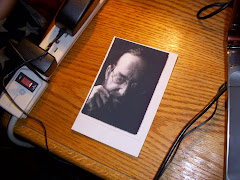The Backstory
Once again, I'm up before dawn here in Colorado, drawn to CenterDoug for warmth against the cold of winter. Eight days to the plane ride to Managua, Nicaragua's disaster-prone capital city, site of earthquakes, volcanoes, insurrections, and wheeling, dealing, dirty street kids, sniffing for some airplane glue. Not my favorite place to be, though it has its centralamericano charms, as well: 90 degree days in January. I've decided to import some updated articles I wrote for the Post Independent in the early Spring of 2000 from Teote, in order to give you all the backstory of my involvement with Nicaragua. Here's the first two:
“Beginnings” (@March 2000)
I’m sitting at my new writing desk, here in my room in Teote, the family dog, Rosie, sleeping at my feet in the heat of a Nicaraguan day. The pine-covered mountains of Honduras out my window remind me of home in Colorado, which is how it should be in my Glenwood’s Sister City. I’m on sabbatical from CMC for a semester, learning Spanish, teaching English, losing weight. Surely, I could not be happier.
Still, I know I will be, for Teotecacinte constantly surprises. I’m well loved here, as there, and the universe showers me with gifts. I’m also “following my bliss,” as Joseph Campbell would say, and I recommend it. My coffee is dark and sweet.
I’ve traveled here many times before, but only for short Brigade trips sponsored by Friendship City Exchange of Glenwood Springs to this impoverished, third world village in Northern Nicaragua. Each time, I’ve lived within my huge, new family of campesinos, the family of don Ramon Antonio Betanco and his wife, dona Eva, my new father and mother. I live at la casa de palomas, home of my sister, Marta Betanco, and her husband, Cesar Urrutia de Talavera; it’s closer to town, but far enough away for peace and quiet. The extended family numbers 93 in Teote. I’m proud that, in this year of the millennium, I have finally learned the names of all the brothers and sisters, nieces and nephews, cousins and aunts that surround me. They all love me, and consider my addition to the family por grácia de Diós, a special gift from Heaven. This is not, exactly, an uncomfortable place to be.
I have a heart for Nicaragua, at least this rural, mountainous, over-exploited part of it, which feels endlessly deep and powerfully blessed. As part of my sabbatical, I’m sharing this love with the readers of The Post Independent, my brothers and sisters in Colorado who are, in truth, paying for it through their taxes and tuition and who support me with their best wishes. There’ll be an article every day while I’m here.
Most of what I write will be as close to the truth as I can make it, within the limits of the veil through which we all must peek in order to even approach the veracity of the Universe; within the boundaries of my own sometimes dubious taste; within the compass of my inadequate Spanish, which creates comical, curious, and, sometimes, crucial misunderstandings I cannot yet avoid; within the personal handicap of being crazy as a loon, especially for the underdog, since I have so often put myself there; and, finally, within the soulful imagination of a creator who reserves the right to change names, places, details, language, emphasis, and even history, in order to make a better story.
But, now, please excuse me. Marta is calling me for lunch, a bowl of her delicious chicken soup. Come. ¡Venga! Join me in my sister’s cocina.
“Pigs in the Kitchen”
The dirt floor of Marta’s kitchen, swept hourly by my Nicaraguan sister with her homemade broom, holds fifty years of heartache and laughter in its stains. At an earlier time, its level matched the bottom of the door, but, now, so many sweeps later, there is a four inch descent from the surface of the swept yard, deep into her maternal domain. She is queen here, benignly ordering the lives of her young children, Arnoldo and Estania, and sharing sovereignty with her husband, Cesar Urrutia de Talavera, whose grandmother Carlita’s house this was, before mortars from Honduras leveled it in the Contra War. Her ancient whip, now Marta’s scepter, three braids of leather mounted to a wooden stock, hangs from a peg on the rebuilt adobe wall here. She has only to point at it, forcibly, to command instant compliance. Everyone gets it, everyone expects it, like the first frost on Labor Day in Colorado. She grabs it off the wall solely to shoo out the pig.
Chanchita, a rusty, shorthaired piglet born four months ago, in whose genes forty years of chancho Betanco y Urrutia range, spends much of the daylight on this floor, while her parents, tied to trees at dawn, forage in the grass and garbage swept across the road. She will grow to loll hugely in the mud one day, offering herself to future broods of piglets grown for sale and for continuance.
She, along with Rosie, the dog and nighttime protector, are the family’s pets, though, in truth, they are not petted. Marta feeds them here. Bits of tortilla, grains of rice fall, a few kernels of corn, special treats for animals in favor, in a house where no food is wasted. And, so, they both wag their tails here, wandering the hard floor, hoping, as do all the inhabitants of Marta Betanco’s kitchen.
This is the one public room, the place for family conferences, for friendly visitations of the happy sort—a yearly visit from Dora, perhaps, Marta’s friend and fellow soldier during the Contra War, now a medical officer in Esteli. Or the village delgado, Andres, not a priest but sanctioned to lead a flock of ardent, newly-excited evangelicals to the catolico light. Or Dormienda, the local curandera, possessor of the old herbal knowledge handed down from the earliest Indios of the Northern Nicaraguan hills, in valleys so remote that the marvels and terrors of the Mayan culture to the North came almost only by word of mouth. There is talk, though, of a small but powerful ancient city, Quacamaya, made of stone now in Teote’s foundations, at the convergence of the Rios Limon and Poteca, where now mi padre’s farm sits.
So many people stop by for a coffee and a chat, for my sister Marta is a woman of consequence in Teote. And, to all of them, without fail, Chanchita comes squealing and mewling, as cute and as funny and as dusty as can be, hoping, as all in Teote hope, for a scrap of a new meal to come. With a “Sha! Sha! Sha-a-a!” and a snap of Carlita’s whip, Marta chases her out, but always with an indulgent smile and a chuckle from her visitor.
This tight-tailed little charmer is the promise of a future filled with pork and dinero and we Betancos know there’s a better chance now, since the Sister City Brigade began to love Teote. From the dust of this kitchen to the computer room at the seven year old high school complex, to the new town hall, through the plazas and the gutters still decorated with snoozing, fatter chanchos, where once mortars exploded, there are new yearnings and fuller stomachs.
Fifteen years ago, there were no table scraps for pigs.
Gracias, CenterDoug
Tuesday, January 22, 2008
Subscribe to:
Post Comments (Atom)
















































































No comments:
Post a Comment